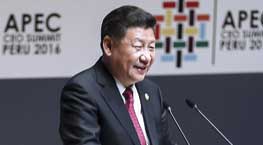By Xinhua Writer Tian Dongdong
BEIJING, Dec. 9 (Xinhua) -- The Japanese government on Thursday broke its own promise made 15 years ago by refusing to grant China "market economy status (MES)," showing once again to the international community that Tokyo simply cannot keep its word.
According to the Article 15 of the Protocol on China's accession to the WTO, to which Japan is a signatory, China will automatically switch over to market economy status in 15 years by Dec. 11, 2016, when the legal foundation for treating China as a non-market economy - or a surrogate country - ends.
By shirking its obligations three days before the deadline, Tokyo not only violates the spirit of the contract, a bedrock of international law and a principle-based system preached by Japan and its Western allies, but also injects negative impetus into its cooperation and relations with China, Tokyo's largest trading partner.
The refusal is nothing short of covert protectionism, which runs against the trend of globalization and poisons the recovery of the global economy.
The penny-wise refusal of granting China the status of a market economy is particularly detrimental to Japan for two reasons. For one, by viewing China as a non-market economy, Tokyo has followed in the footsteps of the United States and the European Union by denying China its deserved status, making itself the "third domino" in unleashing the monster of protectionism, which isn't good news for the global economy.
For another, Japan's narrow-minded decision will trigger a new wave of mistrust in East Asia, dampen the hard-won momentum of development in its ties with China and consequently put regional peace and stability at risk.
Considering Japan's sluggish economy and forecasts of negative growth, the opportunity to boost mutual trust and economic ties with its largest trading partner should have been of vital concern. Unfortunately, it just spurned a golden opportunity.
In addition, considering the number of countries that are deemed by Japan and its Western allies as MES winners, the granting process is merely another double-standard applied by the West against China.
Nevertheless, the refusal won't change anything. It won't write off the achievements of China's 38 years of reforming and opening-up. It cannot water-down China's profound contributions to the global economy either.
Analysts agree that Japan and its allies should end zero-sum mentality and show willingness for mutually beneficial cooperation when dealing with China.










